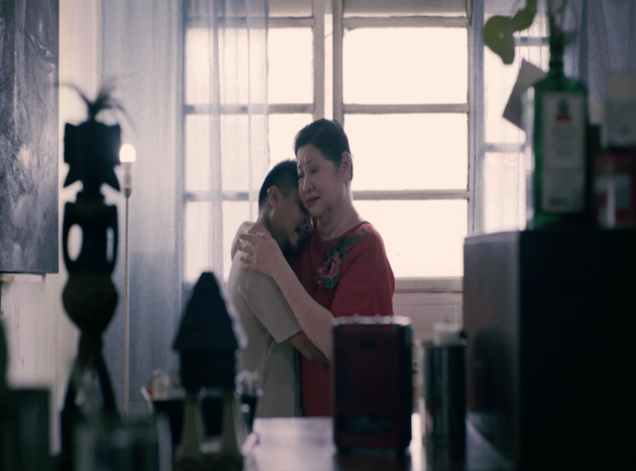The difficult theme of true gay love
The difficult theme of true gay love
 FILM REVIEW: Memories of Forgetting (Mga Alaala ng Paglimot)
FILM REVIEW: Memories of Forgetting (Mga Alaala ng Paglimot)
By Lui Queaño
The Philippine Reporter
Cast: Dexter Doria, Noel Escondo and Jonathan Ivan Rivera
Director/Writer: Jose Altarejos
Synopsis: Jim (Noel Escondo), a filmmaker, comes to grip with his affection for Michael (Jonathan Ivan Rivera) a young actor he had worked with five years ago. At the time, while doing their film project, Michael had quit for no clear reason. The film quickly progresses to the present, when as Metro Manila goes into lockdown due to the pandemic, the two cross paths again, an encounter that initially is dramatic and confrontational, but readily becomes erotic and ends up in renewed romance.
Meanwhile, Jim’s mother, Yvonne (Dexter Doria), a migrant worker in Europe returns home to be with Jim and his sister Ana, but unexpectedly dies of heart attack and puts their relationship to a halt. At a wedding, Jim and Michael meet again. Will the love remain or will they go their separate ways?
 Review: Jose Altarejos brings another adrenaline-filled, gay love-inspired movie to the big screen. We see same familiar typecast portrayal of gays, oil-skinned, making love, this time, with a movie, Ang Lalake sa Parola (A man in the lighthouse) which Altarejos himself directed in 2007, in the background, and from which is derived this movie’s opening line, “ nagpapakita lamang daw ang diwata sa lalaking minamahal niya”. Thus, as expected, the film picks up, it would seem, from where, “Ang Lalaki sa Parola,” had started, the love theme becoming a bit more elaborate no matter if it is, specifically, written, dramatized, and defined in the relationship between characters of same sex. On the whole, drama narrates the story of a past love affair that gets resurrected or rekindled as the two who have long been separated meet and find each other again.
Review: Jose Altarejos brings another adrenaline-filled, gay love-inspired movie to the big screen. We see same familiar typecast portrayal of gays, oil-skinned, making love, this time, with a movie, Ang Lalake sa Parola (A man in the lighthouse) which Altarejos himself directed in 2007, in the background, and from which is derived this movie’s opening line, “ nagpapakita lamang daw ang diwata sa lalaking minamahal niya”. Thus, as expected, the film picks up, it would seem, from where, “Ang Lalaki sa Parola,” had started, the love theme becoming a bit more elaborate no matter if it is, specifically, written, dramatized, and defined in the relationship between characters of same sex. On the whole, drama narrates the story of a past love affair that gets resurrected or rekindled as the two who have long been separated meet and find each other again.
Jim (Noel Escondo) wrestles with his emotions to confront Michael (Jonathan Ivan Rivera) on finding him again, after their long separation. They both take the opportunity in their quest to find answers to their love expressed in anger, at first, and then go on to romantic palavering and awkward conversations, even as they struggle out of the shell towards where, perhaps, each one ought to be.
The film’s narrative line thus sails through those quick turns and intercuts to brief moments of recall and flashbacks, rendered in vivid cinematography and accompanying music that Altarejos adeptly integrate in the film. It is to the credit of director Altarejos and all his cast and crew that the film succeeds in clear and vivid film language (script, acting, cinematography), what it wants to convey about true and boundless love that embraces and unites all of humanity, be it between parents and children, men and women, or, in this particular story, even among those of the same sex and gender preferences.
The actors both shone in their respective roles: Escondo , a short- film director himself, was superb and naturally delivered his lines in a very down-to-earth way, while Rivera, a theater actor and a trained magician in real life, was equally excellent and obviously comfortable with Altarejos’s directing style, as well as, the film’s erotic and romantic tone.
The one actor that stood out in the film was Dexter Doria as Yvonne. Her portrayal of a mother suffering from an early sign of Alzheimer in the film brought out her acting prowess brilliantly. Dexter Doria, as we know is the famous and veteran actress whom we have seen in more than a hundred Filipino films and who has had some forty years of experience in Philippine cinema playing mostly supporting roles throughout her career. As the OFW mother, her role represents the typical narrative of a Filipina migrant worker in a foreign land, taking on the sacrifices, sufferings, and discrimination brought upon her by her employers and by the very circumstance of exile and displacement in a foreign land. She plays the role quite well and with full feeling, one empathizes and loses oneself in her sad story, of exile, return, and death, no matter if only briefly told and dramatized in the film itself.
Altarejos’s directorial work showed full control and gained his actors’ confidence and excellent acting. The tone and texture of the film using various elements from his early days of Ang Lalake sa Parola (The Man in the Lighthouse) to Memories of Forgetting (Mga alaala ng Paglimot) both used phallus symbols: parola (lighthouse), carillon and vertical shots of buildings that speak of how Altarejos handled artistic expressions without necessarily bringing out erotic vulgarity of the flesh onscreen.
Memories of Forgetting is an exciting film and a bit different from the run-of-the-mill type, especially, as it plays out the rather difficult theme of true (gay) love.
Comments (0)